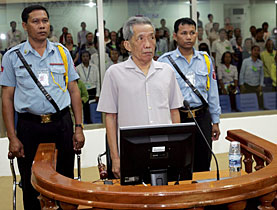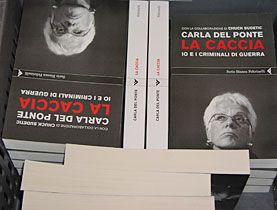Academics look to bolster war crimes defence

Geneva universities have joined forces with international tribunals in a move to strengthen the defence of people standing accused of war crimes against humanity.
An agreement to bolster work by defence lawyers was signed by the law faculties at Geneva University and the Graduate Institute in Geneva and by the defence sections at the international criminal tribunals for the Former Yugoslavia and Lebanon. It is the first of its kind.
The field of defence in war crimes cases is expanding but is still in its infancy and as a result has raised many issues.
For example, can one say there is an internal conflict in a region that is seeking independence but has not been recognised internationally, such as Kosovo a few years ago? What status should be given to a witness who is also accused in another case? How can victims be dealt with in cases of mass crimes? What action should be taken with a war criminal who recognises his crimes and repents?
“The offices for the defence are entrusting legal research to groups of students in Geneva,” explained Robert Roth, a professor of criminal law who heads the project alongside Paola Gaeta and Andrea Bianchi.
“The team of students so far established will conduct research under our supervision. They will then submit a report to the offices for the defence which will have it mandated.”
The terms of the agreement prohibit direct contact between students and the accused.
“This distance is essential to protect the risk of interference,” Roth said. “They must avoid involvement in serious political and human matters. Students must also commit to the strictest confidentiality.”
Heavyweights
To allow aspiring lawyers to better assess the challenges faced by lawyers for war criminals, Geneva University invited three heavyweights to address the proceedings surrounding the signing of the agreement on October 5.
The first, François Roux, has defended the Khmer Rouge chief torturer Comrade Duch and was recently appointed to head the defence in the Special Tribunal for Lebanon looking into the 2005 assassination of Prime Minister Rafik Hariri.
The second, Slobodan Zecevic, a lawyer in the Belgrade bar who heads the defence in the International Criminal Tribunal for the Former Yugoslavia, has defended former Serbian President Milan Milutinovic.
Finally, Swiss lawyer Guenael Mettraux has focused during his career on defence in international courts. The author of several reference books, he has looked in particular at the question of responsibility in the chain of command.
All three cited problems in the field of defence such as sensationalist media headlines, cultural misunderstandings, the difficulty in creating a relationship with a witness when defending a war criminal, the disproportionate size of files and the practical difficulty that ensues when searching for proof.
“One of the primary objectives of these courts is the fight against impunity. But the judge must forget this and deliver justice impartially,” Roux said. It is up to the prosecutor to fight against impunity and for the accused to be presumed innocent by the judge, he added.
Obstacles to proper defence
Zecevic illustrated the workload of a defence counsel in international criminal justice: two-and-a-half years spent four hours a day, five days a week, 42 weeks a year on the issue. It is up to the lawyer to find time on the side to prepare the defence for his client and do his other work.
Paperwork can amount to around half a million pages and court exhibits can run into the thousands. While prosecutors are assisted by at least 20 people, the defence has at most five assistants.
Mettraux meanwhile highlighted the lack of uniformity in the level and type of training of judges.
“They are often experts in public international law, diplomats, university professors. Rarely career judges. The lawyer must therefore constantly adapt to his audience.”
It is also difficult to manage what the Swiss lawyer calls “legal uncertainty”, procedural rules that change as issues arise.
Mettraux noted other difficulties include how hard it is for the defence to establish trust with witnesses when the accused is facing very serious charges and how hard it therefore is to obtain evidence.
The answers are to be found in United Nations documents, in reports by international experts who return from the field, in embassies, in testimonies – a lawyer must morph sometimes into a diplomat or detective to find them.
Carole Vann, InfoSud/swissinfo.ch (Translated from French by Jessica Dacey)
On December 13, 2005 the Lebanese government asked the UN to set up an international tribunal to try perpetrators of a bombing which on February 14, 2005 killed the former Prime Minister Rafik Hariri and 22 others. The tribunal is the first time that a UN-based international criminal court will be trying a “terrorist” crime committed against a specific person.
The tribunal’s jurisdiction could extend beyond the attack on February 14, 2005 if it finds that other attacks that occurred in Lebanon between October 1, 2004 and December 12, 2005 have, in accordance with the principles of justice criminal, a link with the attack and are similar in nature and severity.
The International Criminal Tribunal for the former Yugoslavia is a United Nations court of law dealing with war crimes that took place during the conflicts in the Balkans in the 1990s.
Since its establishment in 1993 it has changed the landscape of international humanitarian law and given victims an opportunity to voice the horrors they witnessed and experienced.
While the most significant number of cases heard at the Tribunal have dealt with alleged crimes committed by Serbs and Bosnian Serbs, the Tribunal has investigated and brought charges against people from every ethnic background. Convictions have been secured against Croats, as well as Bosnian Muslims and Kosovo Albanians.
Established as an ad hoc court, the Security Council endorsed the Tribunal’s strategy for a staggered and ordered closure. Estimates as of autumn 2009 suggest that all but four of the court’s trials will conclude in 2010, three more in early 2011, and the final trial, that of former Serbian politician Radovan Karadzic, in early 2012. Karadzic’s trial is scheduled to start on October 26.

In compliance with the JTI standards
More: SWI swissinfo.ch certified by the Journalism Trust Initiative












You can find an overview of ongoing debates with our journalists here . Please join us!
If you want to start a conversation about a topic raised in this article or want to report factual errors, email us at english@swissinfo.ch.